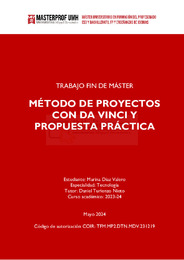Por favor, use este identificador para citar o enlazar este ítem:
https://hdl.handle.net/11000/32875Registro completo de metadatos
| Campo DC | Valor | Lengua/Idioma |
|---|---|---|
| dc.contributor.advisor | Turienzo Nieto, Daniel | - |
| dc.contributor.author | Díaz Valero, Marina | - |
| dc.date.accessioned | 2024-08-02T09:45:59Z | - |
| dc.date.available | 2024-08-02T09:45:59Z | - |
| dc.date.created | 2024-06 | - |
| dc.identifier.uri | https://hdl.handle.net/11000/32875 | - |
| dc.description | Especialidad: Tecnología | es_ES |
| dc.description.abstract | Este trabajo final de máster (TFM) tiene como antecedente la necesidad de analizar el método de proyectos y cómo influye en el logro de las competencias clave del perfil de salida de la etapa educación secundaria obligatoria y, tiene como objetivo plantear una propuesta práctica relacionada con una situación de aprendizaje. El método de este TFM se desarrolló primero con la revisión bibliográfica de publicaciones académicas y artículos científicos que permitieron verificar cuáles son sus ventajas y cuáles sus limitaciones. Como resultado podemos establecer que el método de proyectos promueve la adquisición de competencias clave, el desarrollo de habilidades transversales y metacognitivas, ayuda a enfrentar sentimientos como el fracaso, frustración y, contribuye a mitigar el acoso escolar. Por otro lado, es necesaria una estrategia interdisciplinar durante la ejecución del método de proyectos para un aprendizaje activo más efectivo. Finalmente se planteó una propuesta práctica mediante el método de proyectos partiendo de un boceto de Leonardo Da Vinci, y siguiendo las directrices del actual currículo vigente de la LOMLOE. Como conclusiones podemos disponer que con la aplicación de este tipo método activo aumentamos la participación y motivación de los alumnos, su autonomía, sus habilidades sociales, aprendizaje cooperativo, pensamiento crítico, empatía, prevenir el acoso escolar, entre otros. Sin embargo, existe también una serie de limitaciones asociadas como, la dificultad existente para poder desarrollar un trabajo de forma interdisciplinar, la falta de formación del profesorado al respecto y, alumnado no preparado en este tipo de métodos, entre otros. | es_ES |
| dc.description.abstract | This master's thesis addresses the need to analyze the project method and its influence on the achievement of key competencies in the compulsory secondary education stage. Additionally, it aims to propose a practical application of the project method to a specific learning situation. The methodology of this thesis involved a thorough review of academic publications and scientific articles to identify the advantages and limitations of the project method. The findings indicate that the project method promotes the acquisition of key competencies, the development of transversal and metacognitive skills, helps students cope with feelings of failure and frustration, and contributes to mitigating bullying. However, an interdisciplinary approach is crucial during the implementation of the project method for more effective active learning. A practical proposal based on the project method was developed, using a Leonardo da Vinci sketch as a starting point and following the guidelines of the current LOMLOE curriculum. The conclusions highlight that the application of this active method increases student participation and motivation, autonomy, social skills, cooperative learning, critical thinking, empathy, and prevents bullying, among other benefits. Nevertheless, certain limitations are associated with the project method, such as the difficulty of developing interdisciplinary work, the lack of teacher training in this methodology, and students who are not prepared for this type of method. | es_ES |
| dc.format | application/pdf | es_ES |
| dc.format.extent | 33 | es_ES |
| dc.language.iso | spa | es_ES |
| dc.publisher | Universidad Miguel Hernández | es_ES |
| dc.rights | info:eu-repo/semantics/openAccess | es_ES |
| dc.rights.uri | http://creativecommons.org/licenses/by-nc-nd/4.0/ | * |
| dc.subject | Metodología activa | es_ES |
| dc.subject | Competencias clave | es_ES |
| dc.subject | Habilidades transversales | es_ES |
| dc.subject | Habilidades metacognitivas | es_ES |
| dc.subject | Interdisciplinariedad | es_ES |
| dc.subject.other | CDU::3 - Ciencias sociales::37 - Educación. Enseñanza. Formación. Tiempo libre | es_ES |
| dc.title | Método de proyectos con Da Vinci y propuesta práctica | es_ES |
| dc.type | info:eu-repo/semantics/masterThesis | es_ES |

Ver/Abrir:
TFM Díaz Valero, Marina.pdf
2,47 MB
Adobe PDF
Compartir:
 La licencia se describe como: Atribución-NonComercial-NoDerivada 4.0 Internacional.
La licencia se describe como: Atribución-NonComercial-NoDerivada 4.0 Internacional.
.png)